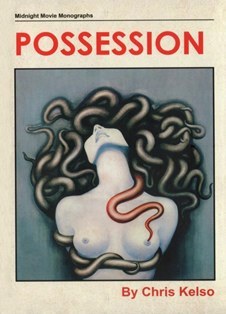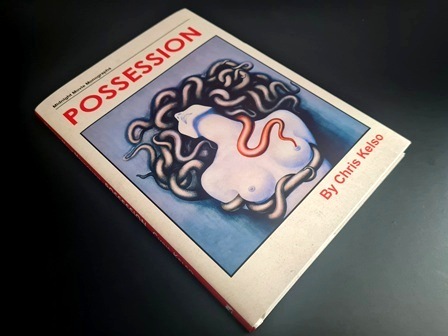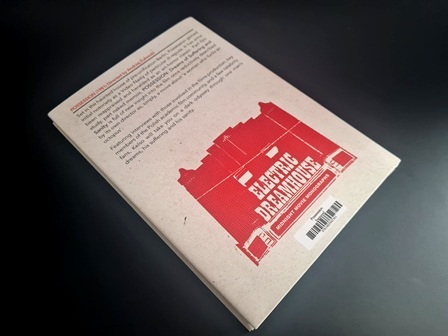
First published back in August of 2025, Chris Kelso’s ‘Possession: Dreams Of Suffering And Sanity’ formed the thirteenth book to be released within the Electric Dreamhouse ‘Midnight Movie Monographs’ series.
The ‘Midnight Movie Monographs’ series is an ongoing series dedicated to cult genre titles, offering up a passionate and in-depth perspective of the films from genre authors, film makers and critical voices from within the genres. In this volume, Kelso dissects Andrzej Żuławski’s notorious film ‘Possession’ (1981).
Over the years since its original release, Andrzej Żuławski’s notorious film ‘Possession’ (1981) has undergone a significant shift in its appraisal, from its original reception as a perverse video nasty to becoming heralded as an art-horror classic.
Written and directed by Polish born Żuławski, filmed in West Berlin during the 80s, and starring French actress Isabelle Adjani and New Zealand actor Sam Neill, the film is a mindboggling mixing pot with culture and political divide simmering within its underbelly.
In essence, the film tells the story of the marital collapse between Mark and Anna, as they wrestle with the pain of their individual worlds within the heart of West Berlin. Early on in the film it emerges that Anna has been having an affair with a flamboyant and overtly confident man named Heinrich, whom Anna’s now leaving Mark for.
However, there’s to be more behind the destruction of the marriage. Whilst Mark’s fragile world collapses around him, Anna’s increasingly erratic behaviour plummets further and further into a swirling dark abyss.
Pain, hurt, anger and gut-wrenching betrayal threaten to smother Mark, as his perspective of utter self-pity blinds him to his own toxicity. But Heinrich is not the reason for the martial destruction. His presence within the escalating madness is merely as an object of distraction. There is something deeper and far more harrowing that is cutting their lives apart.
The inner self-destruction, the corruptive self-loathing, the denial, and the bitter hurt that’s been inflicted, has magnified into physically. Flesh and blood. Pain and hurt.
This is far, far more than just a film about “a woman who fucks an octopus”. The film reaches into us, pulling on our guts and revealing something within us all which we shudder (and squirm) to see…
Chris Kelso was absolutely the right man for this book. His emotional engagement with Żuławski’s film goes far beyond what I had expected. His personal attachment and difficult relationship with the movie are written across every page. Nevertheless, Kelso doesn’t shy away from peeling back his own skin to expose the rawness of his own past to talk about the colossal impact the film had on him.
In one part Kelso’s writing on ‘Possession’ is an emotional admittance to his past which still lurks somewhere in the shadows of his memory. His honesty and sheer openness to casting this to paper is courageous and powerful in itself. Almost a final severing, or indeed an exorcising, of a lingering tendril which he’s carried with him through his life. As such, there’s an emotional journey exhibited throughout the book which you probably would not have expected to have encountered in the book. Something human and purposeful that rises from Żuławski’s quagmire of artistic filth, hurt and horror.
Yes, the book is fundamentally about a movie. But the movie has bonds with Kelso’s past. Deep emotional connections the writer’s made with the film ever since his first viewing of it. The way Kelso writes about the impact ‘Possession’ had upon him, the self-destruction echoed between his life and the film, it’s all so utterly captivating and courageously personal. The words he presents to you forming a journey through the book and the film, drenched in pain and self-hatred, but one exhibiting the most human displays of hope.
Like a phoenix tearing through the intestines of self-pity, self-loathing and self-destruction, there’s always a sense that life will prevail. And for Kelso it did in such a magnificently beautiful way. He truly deserves every blessing life hands to him.
But that’s Kelso. This, however, is fundamentally still a book about the film – ‘Possession’. And so, we also get a veritable shit tonne of insight into the film, its creator and creation, and the meaning behind its many layers. Throughout this Kelso presents moments of thought-provoking self-reflection, designed to become a catalyst for inner conversation with ourselves, as we attempt to digest the horror that’s sliced and diced before us.
Kelso takes us through how the film represents a very male nightmare. Something buried deep within the male ego, where we become sensitive only to our own suffering. Without ever breaking stride, Kelso shows us the many pieces of genius within the film, such as the simplicity of the title, with its multiple meanings, perhaps for many (including for me) laying hidden in plain sight.
Then we have the brutality of the film writer’s messages, either screamed or whispered within the movie. Żuławski’s admittance to toxic masculinity, which has you pausing to self-reflect. The male fantasy. How Mark and indeed Żuławski wanted – in some ways demanded – their women to be the picture of their egotistical feminine fantasy: maternal, cheerful, serene. And so, from there how ‘Possession’ is instead a testament to female strength. A crumbling tower of male ego, blind suppression and arrogant self-pity, where women are the cast iron supports providing the inner foundational strength.
Through the different chapters of the book, Kelso shows us time and again how the blood smeared fingerprint of Żuławski is plainly evident across the entirety of the film. Written at the time of Żuławski’s own painful divorce, it’s the sincerity and authenticity within the film which we the viewers are ultimately responding to. The brutality of the anger, hurt and inherently masculine reaction to this is seen throughout the film, for which Kelso guides us through with zero pretentiousness within his guiding finger.
This examining of the film, its messages, its complexities, the many layers and the personal journey – it tells a story unto itself. Kelso’s own past which he openly (and selflessly) offers to us as an aid to bridge the void between reality and Żuławski’s film. One which tells the impact of the decaying relationship Kelso experienced with an ex-girlfriend he simply names “X”. This connection Kelso continues to experience with the film, breaths an emotive life into his subsequent scrutiny of the movie. Indeed, this is no dry examination of a cult film, but rather there’s Kelso’s own blood in the veins of his analysis. Less of a surgical dissection and more a ripping and clawing at its guts.
Accompanying this we also have so much insight into the making of, the mechanics, and the thought put into the creation of this art-horror masterpiece. From the Polish synth film score to the mind-boggling use of colour within the film. The knowledge and analysis in itself are breathtaking.
Embedded within the latter sections of the book we have the full transcript of a conversation between Jörg Buttgereit (of ‘Nekromantik’ fame) and writer, author and photographer Graham Rae. These pages of conversation provide an incredibly candid discussion about ‘Possession’, explaining Buttgereit’s personal connection with the movie, the importance of its West Berlin setting, and what he saw with the film’s impact upon an unprepared audience. Buttgereit’s words about the film are rawer and more conversationally delivered than Kelso’s finely tuned essayist writing – but in no way less intriguing and thought-provoking.
As a whole the book is akin to Frankenstein’s masterpiece. The stitching together of so many parts, so much that sets the mind off along self-reflective pathways, so much insight and intrigue. Reading the book is not a dry affair. It’s dripping wet with personality and human honesty.
Even the presentation of the book is something to take a second over. The numerous pen and ink illustrations which accompany the text throughout. The photographs, the footnotes, the frigging faux-cinema ticket stub that’s signed by Kelso. There’s evidently such a vast amount of thought and love that’s been put into the book.
I watched ‘Possession’ just prior to reading Kelso’s book. Now that I’ve read the book from cover to cover, had Keso’s guiding hand take me through the guts of the film along with the shadows of his own past, and now I’ve had an evening contemplating the book itself for this review, quite unexpectantly I’m going to sit in a darkened room and rewatch the film all over again. Rewatch it with new eyes. Perhaps in some places, and in some ways, seeing the film with hints of Kelso’s own eyes. In my head, that speak volumes about how fucking good Kelso’s examination of ‘Possession’ was. I truly exceptional read.
The book runs for a total of 84 pages.

© DLS Reviews









